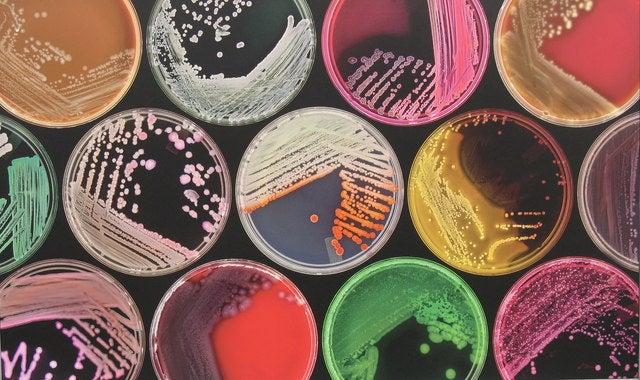Your Microbiome May Hold Keys To Cancer Treatment
The answer has been inside you all along

Today, the field of oncology is exploring new and diverse ways to fight cancer, from antibodies to vaccines to cracking the genetic code. All of these biological elements affect how cancer starts and how doctors can treat it. But according to a review published today in Science, the bacteria living in and around our bodies may hold keys to more effective cancer treatment in the near future.
Human bodies host a staggering number of bacteria, living inside and outside our bodies in the intestines or on the skin. In recent years, these communities of bacteria, called microbiomes, have gotten much more attention, linked to many aspects of health.
The microbiome has also been shown to play a role in cancer. Many bacteria have evolved to change the DNA of other cells as a defense mechanism, which can lead to cancer’s onset or its treatment. Some types of bacteria have been shown to cause cancer under certain conditions. The parts of the body where bacteria are most populous are particularly hardy, effective at protecting the bacteria from penetrating the boundary into more sensitive parts of the body where they could cause harm. But if there’s a breach of normal protections and some of these particular kinds of bacteria get through, they can be carcinogenic.

When good bacteria go bad.
Bacteria can affect cancer in three ways: by changing how much human cells reproduce, by affecting the immune system, and by influencing cell metabolism. When in a new environment, bacteria can turn off our cells’ immune responses, or turn them on unnecessarily, creating inflammation and autoimmune conditions that break down tissues. Diets heavy in fiber or fat might change how intestinal bacteria metabolize energy, creating an acid as a byproduct that can make colon cancer more likely to happen, though studies so far have come to conflicting conclusions.
The tools are getting better. Tumor cells can be genetically sequenced to see if bacteria have affected them and, if so, the role that bacteria play in the microbiome. Oncologists can now engineer bacteria to kickstart the immune system to help combat certain kinds of cancer or other cancer-causing bacteria, or to turn off the genes causing the cells to grow out of control in the first place. Treatments that act as heat-seeking missiles, treating only the cancer and not poisoning the entire body, can work better with boosts from the local microbiome.
Now that they understand some of the basic ways in which bacteria can play a role in cancer, researchers still have a lot of questions. They want to know other ways that bacteria might affect cancer, if they can make different types of treatments more or less effective, if single microbes can make a difference or if they need to be in a particular configuration. They want to know the role of diet in understanding gastrointestinal cancers like colon cancer, or why immunotherapy works better in some microbiomes (like on the skin or in the stomach) than others (like the colon), and why the efficacy of these treatments vary from person to person.
Future research will also look at how to use bacteria to diagnose cancer and identify those patients most susceptible to side effects and complications. Though the microbiome requires a lot of interdisciplinary research, says the review, it could hold important answers to fighting and understanding many different types of cancer.